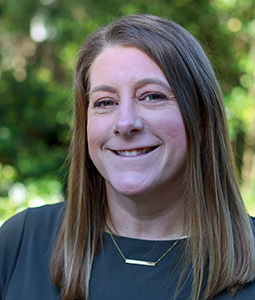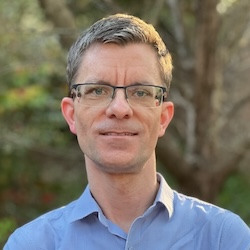Meet the 2024 Ada B. Thomas Outstanding Advisor Award Winners

Katherine Blanton, College of Hospitality, Retail, and Sport Management
Katherine Blanton joined the academic advising staff in the College of Hospitality,
Retail, and Sport Management in 2017. In addition to her academic advisor duties,
she also teaches University 101, EDFI 300, and most recently "Life as a Classroom
(Taylor's version)" offered through Continuing Education and Conferences.

Dr. Jeff Turner, Philosophy
Dr. Jeff Turner has been with USC for 17 years where he has served as an instructor
for the Philosophy Department and as a departmental Academic Advisor.
Q&A with the Award Winners
Tell us about your path to becoming an academic advisor.
Katherine Blanton: It goes goes back to my undergrad experience, because we did not have required advising
at the university I attended. I thought I could advise myself through my program,
and then when I reported to the office that I was ready to do student teaching next
spring, I realized I was off track. I ended up having to stay in school for an extra
semester. I was not seeking the assistance or support of an advisor, so I kind of
carried that with me into my journey. I taught high school for a number of years and
then started working at a community college as an instructor, and there was a semester
where they had an overload of students and needed some assistance with advising. I
realized I liked advising way more than teaching full time, so to be able to balance
advising and teaching has been really the crux of my career.
Jeff Turner: Our Director of Undergraduate Studies was doing advising and was looking to retire.
He brought me and another colleague on to help with advising . Over the course of
a few years, it was decided that I would take over the advisor role. I became the
principal advisor [for the Philosophy Dept] in Fall 2014.
Early on I ask my students 'What are you passionate about? What lights your soul on
fire?' Let's do that.
- Dr. Jeff Turner, Senior Instructor and Academic Advisor, Philosophy
How would you describe your advising style?
KB: I keep a lot of lists and spreadsheets, so I know what my students should be doing
in any given semester. I check and if they're not [I follow up with them]. As advisors
the further we are removed from our own undergraduate experience, we forget what the
day to day looks like for our students. We assume something like registering for classes
or remembering where things are is the only thing that [students] are doing and it's
not. I think we have to remember our students lead very full lives. it's important
to remember we're supporting them as advisors, but we also we need to empower them
to do things on their own. It's a very delicate balance between doing things for them
and encouraging them to do things for themselves and advocate for themselves while
also teaching them to be more responsible.
JT: I like to make sure I'm available to the students as often as they need me. I've
tried to create a kind of trust with the students early on. I tell them to email me,
update me, and communicate with me, because it's better for both of us that we're
aware of everything going on [in the student's academic journey.] I establish a relationship
early on, and then ask students to let me know if they have problems of any kind,
even if it doesn't seem like "an advisor problem." I also try to demystify academic
requirements.
Being a quality advisor is not just telling students what classes to take, but establishing
lasting relationships with students, their families and with other colleagues and
people in the community.
- Katherine Blanton, Undergraduate Academic Advisor, College of HRSM
The Ada B. Thomas award recognizes academic advisors who offer quality advising to
undergraduate students. What is your definition of quality advising?
KB: It goes back to providing students with not only academic advising, but also life
"advising", university "advising" and resource and professional advising. It's going
beyond just telling them what classes to take every semester, but also building a
relationship with them. Even after graduation when they're considering a graduate
program and realize they need letters of recommendation, they think of Miss Blanton
and feel comfortable asking me for a recommendation. Quality advising for me is also
being a valued member of the Gamecock community, so serving on committees, volunteering
at events, attending events so that people in the in the Community know who I am,
know my name, and so they can use me as a resource as well. Being a quality advisor
is not just telling students what classes to take, but establishing lasting relationships
with students, their families and with other colleagues and people in the community.
JT: I want to make sure I can answer student questions to keep them on the path they
want to be on. I don't want to push them in the direction of doing things they're
not comfortable doing. I spend a lot of time in their early semesters asking them
questions about what they're enjoying and what they think they might like to do next,
so I can eventually get to the question of what's beyond [their time at] the University.
I often have students who come to me and say "my parents are putting a lot of pressure
on me to add a "practical" minor." I tell them we can do that but let's try to find
something that works for you and your interests. Early on I ask my students 'What
are you passionate about? What lights your soul on fire?'. Let's do that.
Ada B. Thomas was known for being direct with her students, while also advocating
for them. What is one thing you hope your students remember about you?
KB: I always had time for them. I think it's important we set boundaries with expectations
for response time or accessibility, but at the same time, meet the students where
they are. Our students are so used to having constant communication and constant connection
with people that I think students will always say that I responded quickly. My students
always know they can always find me and if my door is open and you don't see a student
in my office, you can come in.
JT: I hope they think I was helpful. Sometimes I have to re-route students who are overly
ambitious and want to pursue double majors, dual degrees, and a minor on each. I have
to address that gently and nudge students to reduce it down to what they really want
to do. I hope they remember [after graduation] it was helpful to be nudged in that
direction.

